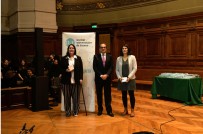- Index
- >Institut Universitaire de France Members
Institut Universitaire de France Members
Two Mint researchers enter the Institut Universitaire de France

Working on innovative nanomedicines and their delivery systems, Élise Lepeltier and Émilie Roger-Talibart have just been appointed to the Institut Universitaire de France (IUF) for 5 years. Since October 1, they joined the IUF, a "wall-less" institute that brings together top-level French teacher-researchers. They have both been appointed to the Innovation Chair, as their work could lead to patents. They are the only two from the University of Angers to be part of the class of 2023. The two Anjou-born women are members of Mint laboratory and work on the 3rd floor of the Institut de biologie en santé, the epicenter of health research in Angers.
A spray against lung cancer
Élise Lepeltier, 35, trained as a chemist. "I discovered nanoparticles by chance, following a lecture by Pr. Patrick Couvreur", a specialist in nanomedicines who became her thesis supervisor. To conclude her studies at the École normale supérieure, "I did my internship in the Biomolecules Laboratory, and I loved it. I really enjoyed the interdisciplinary nature of the work". During her PhD, she explored a process for "making new anti-cancer nanoparticles, without excipients, by self-assembly. They form spontaneously in water".
After a 2-year post-doctorate in Saarbrücken, Germany, Élise Lepeltier joined the UA in September 2015, teaching chemistry at the Faculty of Health, and continuing her research on anti-cancer nanoparticles. Her project: offer people with lung cancer the equivalent of Ventoline for asthmatics, i.e. a spray capable of transporting the treatment as close as possible to its target. "I'm working on an anti-cancer agent already in clinical use, which we're going to modify so that it self-assembles, is more effective and precisely targets the tumor".
There's still one obstacle to overcome: "For a long time, we thought that the lung was a sterile environment. But over the last ten years or so, we've learned that there's a local microbiota, a natural barrier that needs to be considered," explains Élise Lepeltier.
Ultimately, the researcher wants to go one step further, by finding a way to "treat different cancers at a local level, by taking the microbiota into account. On the skin, for example, there is also a specific microbiota". This ambition is at the heart of a European project that she intends to defend in the near future.
Innovative treatments to swallow
Émilie Roger-Talibart is also aiming for a grant from the European Research Council. A graduate of the Faculty of Pharmacy in Angers, she is developing "new particulate systems for oral administration".
Swallowing a drug is still the most practical way of administering it. But many molecules with proven efficacy cannot be administered this way. "Peptides have shown great interest, but the problem is that if you swallow a peptide, it will quickly degrade or not be absorbed," notes the 42-year-old researcher. Her idea: put the active molecule in a protective "cage".
This principle was at the heart of her CIFRE thesis, supervised by Pr. Jean-Pierre Benoît and Pr. Frédéric Lagarce, and defended in Angers in 2009. For 3 years, she worked with a pharmaceutical laboratory to develop vectors for encapsulating anti-cancer molecules for oral administration.
After a post-doctoral detour at the University of Minneapolis, USA, and a first teaching-research position in Strasbourg, Émilie Roger returned to Angers. And resumed her research into the oral administration of drugs. For the past 5 years, the senior lecturer has been working on a new nanoparticulate system, the production of which requires no organic solvents (and is therefore less toxic), capable of encapsulating active molecules. "The aim of the project I have submitted to the IUF is to follow this cage after ingestion, to see how far it goes in the digestive system before being degraded and, therefore, releasing the peptide".
The final stage of this long-term project will be to develop a tablet carrying the nanoparticulate cage and its active molecule.
Institut Universitaire de France, for an outstanding research
The Institut Universitaire de France designates a group of teacher-researchers selected by an international jury for the exceptional quality of their research, called members, who receive a two-thirds release from their teaching duties, a bonus and a budget allocation.
L'IUF's mission is to encourage the development of high-level research in universities and to strengthen interdisciplinarity, by pursuing three objectives:
To encourage institutions and teacher-researchers to achieve excellence in research, with the positive consequences this can be expected to have on teaching, the training of young researchers and, more generally, the dissemination of knowledge.
Contribute to the feminization of the research sector.
Contribute to a balanced distribution of university research across the country, and thus to a policy of scientific networking.


